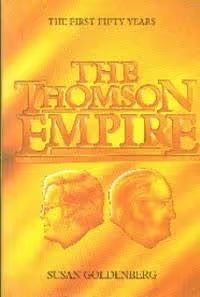Jack Kent Cooke Part 2: Building and Selling His Canadian Empire
Jack Kent Cooke’s Toronto radio station was doing well, so he started and acquired businesses that provided services to it. For instance, he purchased a small ad agency and started a service that syndicated radio shows in Toronto. According to his biography, owning these companies decreased expenses for his station and allowed Jack to profit when other stations needed the same services.
Jack was also doing deals with his partner Roy Thomson. They bought a drive-in movie chain, two national radio sales agencies, and other businesses. But one of their deals landed Jack in legal trouble: the 1947 purchase of an edgy and unprofitable magazine, Liberty. Roy and Jack bought it for $400,000, each owning 45%. But the magazine’s content got Jack sued for libel and led to criminal charges against him for “conspiring to publish defamatory libel.” Jack was acquitted, but the magazine was a financial drag, losing more than $300,000 over the years before finally turning a small profit. Jack’s experience with Liberty led to his 1952 purchase of a publishing empire, which included Saturday Night and other national and trade magazines owned by Consolidated Press. Jack had added publishing entrepreneur to his resume.
The Consolidated Press deal was significant but didn’t include Roy. The partnership between the two soured when Jack cut Roy out of a lucrative consulting deal to manage an Ottawa radio station. Roy felt Jack broke their agreement to share in each other’s deals and opted not to partner with him on deals anymore, although they remained business associates. Jack didn’t need Roy as a partner anymore. He was financially successful and started doing deals on his own. He had six offices in Toronto for his various businesses, which he bounced between daily.
Jack wanted to own more businesses in leisure industries, so in 1951 he bought the Toronto Maple Leafs, a minor league baseball team, for $200,000. With his knack for promotions and flair, Jack turned the games into must-attend events in Toronto. He also used the games as content for his radio station and did play-by-play calling of each game. He tried to do the same with local hockey team games, but because he didn’t own the team or the rights to broadcast the games, he was charged with radio piracy by the Canadian government.
Jack kept buying businesses. In 1956, he bought a company that owned two plastics factories and an aluminum foundry. Jack saw plastics as the future and a growth industry he wanted to be part of. His ownership got off to a rocky start when he sued the seller for misrepresenting the value of the inventory he’d bought.
Jack’s dream was to start Toronto’s first TV station, and he’d been working it for years. He needed to be awarded the first license to turn that dream into reality. When Jack submitted his application to the Broadcasting Board of Governors (BBG) in 1960, his past tussles with regulators and his reputation for stuffing too many ads per hour into his radio broadcasts worked against him. In a crushing defeat, the license was awarded to another group.
After his television broadcasting license application was rejected, Jack made a major move. He uprooted his family and moved to California. He didn’t just move; he pulled off political wizardry to make it happen. Jack and his high-powered lawyers convinced the U.S. Congress to create a special bill for Jack. It allowed him to become a U.S. citizen immediately, bypassing the normal five-year waiting period, and backdated his citizenship by a decade. It passed the House and Senate and was swiftly signed into law by President Dwight D. Eisenhower. Jack had become powerful and connected not just in his home country but in the United States too. As a U.S. citizen, Jack couldn’t own certain Canadian companies, so he sold his radio stations, publishing business, and baseball team.
Having friends in high places paid off again for Jack. That same year, his well-connected lawyer, Bill Shea, shared an opportunity to buy into an NFL franchise. Jack jumped at the chance and paid $350,000 in 1961 to purchase 25% of the Washington Redskins (now the Washington Commanders).
This deal kickstarted Jack’s life as a U.S. citizen and launched what would become a professional sports team empire for him.






